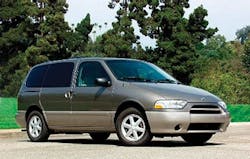AutoFocus: Don't dump on the dumping unit
If you encounter a Nissan Quest/Mercury Villager minivan (up to the 2002 model year) with the left front brake locking up, see if the right rear brake is locking up as well.
This vehicle has a component called a “dumping unit” that is screwed into one of the outlet ports of the master cylinder. The brake line for the left front and right rear brakes come out of this dumping unit. It has been common for the dumping unit to prevent brake fluid from returning back into the master cylinder and releasing the left front and right rear brake, thus resulting in the left front and right rear brakes staying applied.
If the left front and right rear brakes are locked up, loosen the brake line from the dumping unit and verify the brakes free up, which indicates that the brake fluid pressure is not releasing on its own. The master cylinder can be pulled away from the brake booster to eliminate the possibility of a brake pedal free play or pushrod adjustment problem; however, one of those problems should affect all four brakes.
We have had several shops tell us that replacing the dumping unit (which comes with a new master cylinder) fixed the brake lock-up problem, but we have also experienced cases where this has not corrected the problem. The dumping unit is only used in the brake circuit for the left front and right rear brakes. There is no dumping unit in the brake line off the master cylinder for the right front and left rear brakes.
(Note: Drilling out the dumping unit as a means of eliminating its ability to lock up the left front and right rear brakes is not advised as this can affect brake pedal feel.)
Recently, one of our Hotline subscribers in South Carolina called about a Nissan Quest with the left front brake caliper and rotor melted down. The left front brake rotor, caliper and brake hose were replaced -- no change; the left front and right rear brake were still locking up after the vehicle was driven for a period of time. When the brake line was cracked loose at the dumping unit on the master cylinder, the left front and right rear brakes freed up. The master cylinder was replaced (to get a new dumping unit) and the problem was believed to be corrected. But after an extended test drive, the temperature of the left front brake rotor was considerably hotter than the right front brake rotor.
Information gathered from a local Nissan dealer indicated the problem was in the ABS actuator. A problem in the ABS actuator was supposedly preventing the dumping unit at the master cylinder from releasing brake fluid pressure causing the brake lockup problem. The ABS actuator was then replaced with a used component but the problem persisted.
The ABS light was now “on,” so ABS codes were checked manually. There was a normal code 12, and a right front wheel speed sensor open circuit code 21. Not knowing if the original ABS actuator had the code 21 stored, the ABS actuator was replaced again. The left front brake rotor was still getting considerably hotter than the right front brake rotor and the code 21 returned. Diagnosing the right front wheel speed sensor open circuit code showed a defective right front wheel speed sensor. The speed sensor was replaced and the code 21 did not return. Checking brake rotor temperatures after a long test drive now showed the brake temperatures to be about the same, fixing the vehicle.
The ABS code was affecting the ABS actuator and the ABS actuator was affecting the dumping unit, causing the dumping unit to hold brake fluid pressure on the left front and right rear brakes.
If you get one of these vehicles in your shop with the left front and right rear brakes locking up, first verify there are no ABS codes that might be affecting the ABS actuator. It is important to also verify that the ABS actuator is not causing the dumping unit to hold brake fluid pressure on the left front and right rear brakes before replacing the master cylinder to get a new dumping unit.
We always appreciate feedback from our subscribers on what fixed the vehicle, and have added this repair information to our Confirmed Fixes database in Direct-Hit.
(For more information on Identifix, visit www.identifix.com.)
